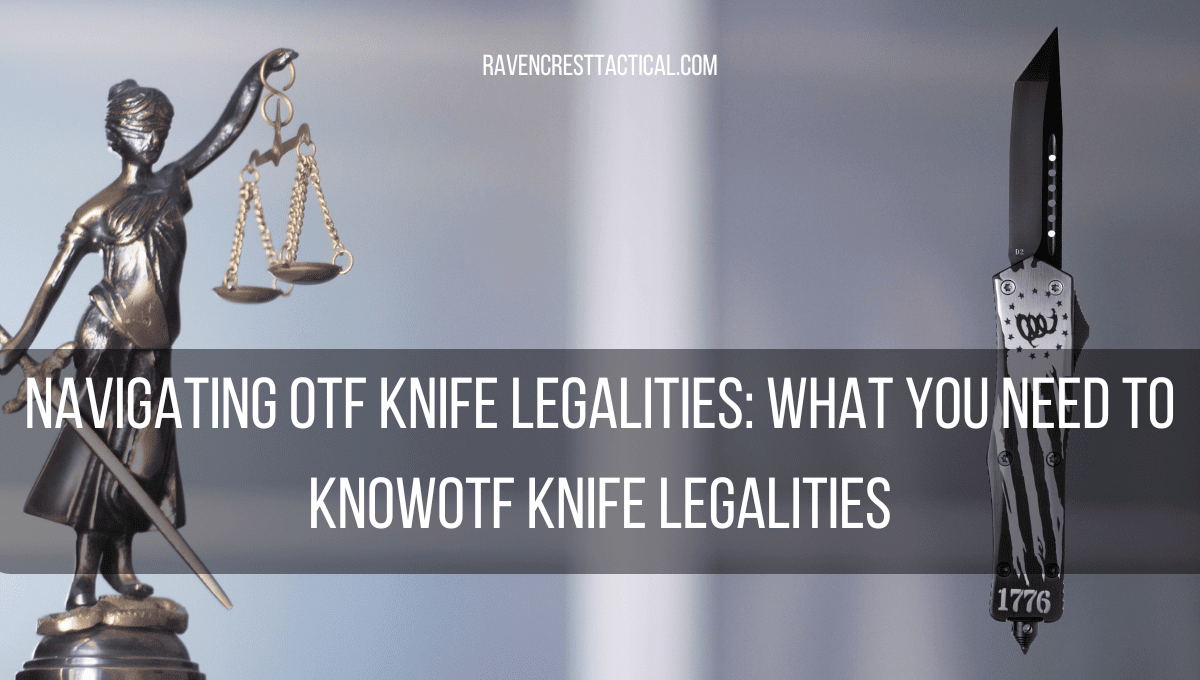Navigating OTF Knife Legalities: What You Need to KnowOTF Knife Legalities

Welcome to our comprehensive guide on OTF knife legalities! If you’re a knife enthusiast or just someone looking to understand the laws surrounding OTF (Out The Front) knives, you’re in the right place. In this article, we’ll delve into the legal landscape of OTF knives, covering everything from definitions to restrictions and practical tips for staying compliant.
Understanding OTF Knives:
Before we dive into the legalities, let’s ensure we’re on the same page regarding what OTF knives are. OTF knives, short for “Out The Front” knives, are a type of pocket knife with a blade that opens and closes through a hole in one end of the handle. These knives are known for their swift deployment and retractability, making them popular among enthusiasts and professionals alike.
Legal Definitions:
The legal status of OTF knives varies from one jurisdiction to another, so it’s crucial to understand the terminology used in relevant legislation. While federal laws provide a broad framework, state and local regulations often dictate specific restrictions. Here are some key terms you may encounter:
- Switchblade: In many jurisdictions, OTF knives fall under the category of switchblades. Switchblades are knives with blades that can be deployed automatically by pressing a button, switch, or other mechanism.
- Automatic Knife: The term “automatic knife” is often used interchangeably with switchblade. It refers to knives that have a mechanism for opening the blade automatically.
Legal Status:
Now, let’s delve into the legal status of OTF knives in various jurisdictions. It’s essential to note that laws can change, so always consult the most recent statutes or seek legal advice for the most up-to-date information.
Federal Law:
At the federal level in the United States, the legality of OTF knives is governed by the Switchblade Knife Act of 1958. This law prohibits the interstate commerce of switchblade knives but exempts certain categories, including knives used by military and law enforcement personnel, as well as those designed for hunting, fishing, or other recreational purposes.
State Laws:
State laws regarding OTF knives vary significantly. While some states have relaxed restrictions, others impose strict regulations or outright bans. For example:
– California: OTF knives are legal to own and carry openly or concealed, provided the blade length does not exceed a certain limit.
– New York: OTF knives are illegal to possess or carry, with limited exceptions for law enforcement and other authorized individuals.
– Texas: OTF knives are generally legal to own and carry, although restrictions may apply in certain municipalities.
Local Regulations:
In addition to state laws, cities and counties may enact their own ordinances regarding OTF knives. It’s essential to research local regulations to ensure compliance, especially when traveling or moving to a new area.
Tips for Compliance:
To avoid running afoul of OTF knife laws, consider the following tips:
- Research: Familiarize yourself with the laws and regulations applicable to OTF knives in your jurisdiction.
- Blade Length: Pay attention to restrictions on blade length, as some jurisdictions impose limits on the size of knives that can be carried in public.
- Concealed Carry: Be aware of laws regarding concealed carry, as carrying an OTF knife in a concealed manner may be subject to additional regulations or prohibitions.
- Stay Informed: Keep abreast of any changes to knife laws and regulations, as legal frameworks can evolve over time.
In conclusion, navigating the legalities of OTF knives requires an understanding of federal, state, and local laws. While the legal status of OTF knives varies from one jurisdiction to another, staying informed and compliant is essential for enthusiasts and users alike. By familiarizing yourself with relevant regulations and following best practices, you can enjoy the benefits of OTF knives responsibly and legally.
